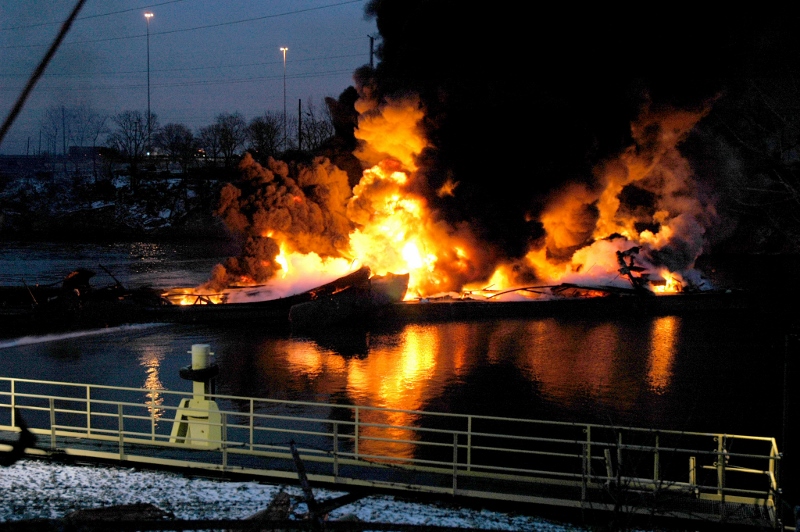A federal appeals court threw out criminal manslaughter convictions from a fatal 2005 Chicago barge explosion, ruling that government prosecutors in an earlier civil trial had failed to prove the victim was obeying orders from the captain that triggered the blast.
Towboat captain Dennis M. Egan of Topeka, Ill., and his family’s company, Egan Marine Corp., were convicted in 2014 of negligent manslaughter and negligent discharge of oil pollution to a navigable waterway. Egan was sentenced to six months in prison and the company ordered to pay a $5.3 million penalty toward cleanup costs.
But in a Dec. 12 ruling, judges with the Seventh District Court of Appeals found the trial judge erred in accepting the government’s argument that crewman Alexander Oliva, 29, died because Egan had directed him to use a small propane torch to thaw out a frozen discharge pump so they could unload a cargo of 600,000 gals. of clarified slurry oil.
The 61.7’x20’x8’, 800-hp tugboat Lisa E was pushing the barge EMC-423 in the Chicago Sanitary and Ship Canal between Joliet and Chicago Jan. 19, 2005, when the explosion tore through the barge, throwing debris hundreds of feet onto the Cicero Avenue bridge. Oliva’s body was not recovered for two weeks and cleanup costs ran to $12 million, according to federal officials.
Prosecutors filed criminal charges in 2010, shortly before a statute of limitations deadline. During the 2014 bench trial, U.S. District Court Judge James Zagel heard from expert witnesses who said an open standpipe vent allowed oil fumes to escape, while the discharge pump was not working because it had been disconnected from a heating system.
Prosecutors argued Oliva used a propane torch at Egan’s direction, and that ignited the fumes.
“Judge Zagel concluded that the defendants were negligent because they knew that the crew occasionally used an open flame to heat the cargo pump, but nonetheless permitted the crew to engage in the illegal and unsafe practice,” said U.S. Attorney Zachary T. Fardon when he announced the Egan sentencing in June 2015.
But the appeals court said that ran counter to the findings in a 2011 civil case, where another judge found the government failed to prove Oliva was using the torch.
“The United States did not appeal from that adverse decision but instead pressed forward with this criminal prosecution,” the appeals judges wrote in their opinion. Egan and Egan Marine argued the prosecutors should not be allowed to bring that charge again, but the trial judge rejected that position.
“The Supreme Court has said that the outcome of a civil case has preclusive force in a criminal prosecution,” the appeals judges noted, laying out examples of other cases where that principle ruled.
“If the United States cannot prove a factual claim on the preponderance standard (in a civil case), it cannot logically show the same thing beyond a reasonable doubt” in criminal court, the judges wrote. They ordered the convictions of Egan and the company reversed.




